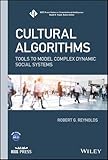Cultural algorithms : tools to model complex dynamic social systems / Robert G. Reynolds.
By: Reynolds, Robert G [author.] .
.
Material type:  BookSeries: IEEE series on computational intelligence: Publisher: Piscataway, NJ : Hoboken, New Jersey : IEEE Press ; John Wiley & Sons, Inc., [2021]Description: 1 online resource (xi, 264 pages) : illustrations (chiefly color).Content type: text Media type: computer Carrier type: online resourceISBN: 9781119403111; 1119403111; 9781119403098; 111940309X; 9781119403104; 1119403103.Subject(s): Social systems -- Mathematical models
BookSeries: IEEE series on computational intelligence: Publisher: Piscataway, NJ : Hoboken, New Jersey : IEEE Press ; John Wiley & Sons, Inc., [2021]Description: 1 online resource (xi, 264 pages) : illustrations (chiefly color).Content type: text Media type: computer Carrier type: online resourceISBN: 9781119403111; 1119403111; 9781119403098; 111940309X; 9781119403104; 1119403103.Subject(s): Social systems -- Mathematical modelsIncludes bibliographical references and index.
""The Foundations of Social Intelligence" covers a wide range of the basic framework of cultural algorithms, from the history of its development to how other nature-inspired algorithms can be expressed. It also demonstrates how the social organizational structures that make up human socio-political systems can be modeled in terms of cultural algorithms. It explores how the learning process is expressed in thermodynamic terms as a cultural engine, while proposing several social metrics to assess their performance. Cultural algorithms are a computational framework for understanding human social evolution based upon anthropological and archaeological models of cultural evolution. The key is how we can we use cultural algorithms as a vehicle to understand why these building blocks are ubiquitous across the globe in computational terms. The performance of the basic social models are compared against each other relative to the different categories of complex systems problems"-- Provided by publisher.
1. System Design Using Cultural Algorithms -- Introduction -- The Cultural Engine -- Outline of the Book: Cultural Learning in Dynamic Environments -- 2. The Cultural Algorithms Toolkit -- Cultural Algorithms Toolkit Overview -- Downloading and Running CAT -- The Repast Simphony System -- Knowledge Sources -- Fitness Functions -- Conesworld -- The Logistics Function -- Cultural Algorithms Toolkit Sample Runs: Conesworld -- Cultural Algorithms Toolkit Sample Runs: Other Problems -- 3. Problem Solving Using Social Networks in Cultural Algorithms with Auctions -- Introduction -- Cultural Algorithms -- Subcultured Heterogeneous Networks -- Auction Mechanisms -- The Cultural Engine -- Cones World -- Experimental Framework -- Results -- Conclusions -- References -- 4. Using Common Value Auction In Cultural Algorithm to Enhance Robustness and Resilience of Social Knowledge Distribution Systems -- Cultural Algorithms -- Common Value Auction -- Cones World -- Dynamic Experimental Framework -- Results -- Conclusions and Future Work -- 5. Optimizing AI Pipelines: A Game-Theoretic Cultural Algorithms Approach -- Introduction -- Overview of Cultural Algorithms -- Cultural Algorithms Knowledge Distribution Mechanisms -- Primer on Game Theory -- Game Theoretic Knowledge Distribution -- Continuous-Action Iterated Prisoner's Dilemma -- Play -- Payoff -- Outcome -- Learning Rate Adjustment -- Test Results: Benchmark Problem -- Test Results: Computer Vision Pipeline -- Conclusions -- 6. Cultural Algorithms for Social Network Analysis -- Case Studies in Team Formation -- Introduction -- Application of Social Network -- Forming Successful Teams -- Formulating TFP -- Communication Cost -- Personnel Cost -- Distance Cost -- Workload Balance -- Why Artificial Intelligence? -- Cultural Algorithms -- Forming Teams in Co-authorship Network -- Individual Representation -- Fitness Function -- Belief Space -- Dataset and Observations -- Skill Frequency -- Forming Teams in Healthcare Network -- Individual Representation.
Fitness Function -- Dataset and Observation -- Summary and Conclusion -- 7. Evolving Emergent Team Strategies in Robotic Soccer using Enhanced Cultural Algorithms -- Abstract -- Introduction -- Related Work -- The 2D Soccer Simulation Testbed -- Evolution of team strategies via Cultural Algorithm -- Experiments and Analysis of Results -- Conclusion -- References -- 8. The Use of Cultural Algorithms to Learn the Impact of Climate on Local Fishing Behavior in Cerro Azul, Peru -- Introduction -- An Overview of the Cerro Azul Fishing Data Set -- Data Mining at the Macro, Meso, and Micro Levels -- Cultural Algorithms and Multi-Objective Optimization -- The Artisanal Fishing Model -- The Experimental Results -- Statistical Validation -- Conclusions and Future Work -- 9. CAPSO: A Parallelized Multiobjective Cultural Algorithm Particle Swarm Optimizer -- Introduction -- Multi-Objective Optimization -- Cultural Algorithms -- CAPSO Knowledge Structures -- Tracking Knowledge Source Progress (Other than Topographic) -- CAPSO Algorithm Pseudocode -- Multiple Runs -- Benchmark Problems Comparison -- Overall Summary of Results -- Other Applications -- 10. Exploring Virtual Worlds with Cultural Algorithms: Ancient Alpena-Amberley Land Bridge -- Archaeological Challenges -- Generalized Framework -- The Land Bridge Hypothesis -- Origin and Form -- Putting Data to Work -- Path-Finding and Planning -- Identifying Good Locations -- Cultural Algorithms -- Cultural Algorithm Mechanisms -- The Composition of the Belief Space -- Future Work -- Path Planning Strategy -- Local Tactics -- Detailed Locational Information -- Extending the Cultural Algorithms -- Human Presence in the Virtual World -- Increasing the Complexity -- Updated Path-Planning Results -- The Fully Rendered Land Bridge -- Pathfinder Mechanisms -- Results -- Conclusions.
Description based on online resource; title from digital title page (viewed on February 24, 2021).
Wiley Frontlist Obook All English 2020


There are no comments for this item.